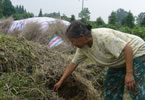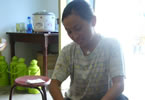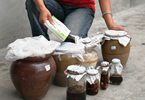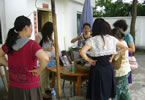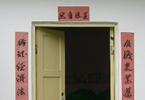- The land’s blessing for the Gao family of Anlong Village, Sichuan
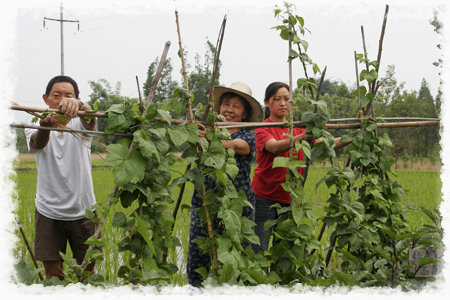
Text: Cynthia Wong / Photo: Cynthia Wong, Xia Lu
Eng Translator: Cheung Choi Wan / John Fellowes
The cycle of love - If you give and care for Nature, Nature will reward you.
In spite of her limited physical strength, which barely allows her to work her small piece of land, Li Zhilan (Grandma Li) insists on practising ecological farming. This is because of her love and concern for Nature and her awareness of the need to protect the rivers, the ecology and the health of the family. “I used to think pollution didn’t concern me. I didn’t know chemical pesticides and fertilizers would seep into the earth and pollute the underground water, causing severe pollution of rivers. I learnt about this after practising ecological agriculture.. Since we live together on this piece of land, we should share it and take care of it together,” Grandma Li told participants of the International Conference on Cultural Resources for Sustainable Development, held in Shanghai in 2006. She was invited to attend the conference and talk about the impact of eco-farming on the land. Now she enjoys once again the gifts of Nature, hearing the songs of birds, crickets and frogs, and even the whispers of earthworms, early in the morning.
In 2006, 64-year old Li met PCD via Chengdu Urban Rivers Association, and learnt how chemical pesticides and fertilizers harm Nature and humans. She decided to convert her land to organic farming. At that time, her children were working in the cities, just like most young people who grew up in rural areas.
Grandma Li, who always has a warm and gentle smile, probably never imagined this simple decision would prove to be a call from the heart. It was a message of Love she sent to Nature – and it inadvertently moved the hearts of her children. They came home, one after another, from their complicated lives in the city, joined in the ecological farming – and never looked back.
“Ecological agriculture is the most meaningful thing”
 “We decided to do this and we wanted to do a really good job, so we put in all our effort,” enthused Gao Qingrong, Li’s second-oldest offspring, who has been engaged in ecological farming for five years. The only daughter in the family, she left the village in 2000 to work in the city and returned home at the end of 2006. She was the first of the siblings to help their parents farm ecologically. Not only has she converted the five mu of land they owned to ecological farming; she has leased other land for the same purpose. She now runs more than 20 mu of land. “When I first came home, I wasn’t used to it. Even though I grew up in the countryside, my knowledge of farming was minimal. But I felt ecological agriculture was very meaningful. Even though our economic income was lower, I didn’t mind cutting down on my expenditure so as to continue this way of living. Now I’m used to it. This way of life is what I’m after.” Gao Yicheng, the elder brother of Gao Qingrong, returned in 2008 to join in the family business. He thought young people should be doing what his parents were doing!
“We decided to do this and we wanted to do a really good job, so we put in all our effort,” enthused Gao Qingrong, Li’s second-oldest offspring, who has been engaged in ecological farming for five years. The only daughter in the family, she left the village in 2000 to work in the city and returned home at the end of 2006. She was the first of the siblings to help their parents farm ecologically. Not only has she converted the five mu of land they owned to ecological farming; she has leased other land for the same purpose. She now runs more than 20 mu of land. “When I first came home, I wasn’t used to it. Even though I grew up in the countryside, my knowledge of farming was minimal. But I felt ecological agriculture was very meaningful. Even though our economic income was lower, I didn’t mind cutting down on my expenditure so as to continue this way of living. Now I’m used to it. This way of life is what I’m after.” Gao Yicheng, the elder brother of Gao Qingrong, returned in 2008 to join in the family business. He thought young people should be doing what his parents were doing!
Six years ago, Gao Qingrong lacked basic farming knowledge. Now she enjoys working in the field every day, and her mind is filled with farming matters. “Now when we plan what to grow on our land, the first principle is to protect biodiversity. We will try to grow different varieties of crops and use the most natural farming methods. We will not grow out-of-season crops. We try our best to preserve and resume growing old local varieties of crops, even though they are considered to be low-yield.” She spends a lot of time reading, to find ways to preserve traditional crop varieties. She has also begun to collect local seeds, hoping to preserve crop varieties and farming culture – both of which are disappearing.
Vanishing farming culture
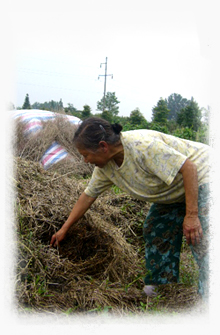 “In the old times, farmers were experienced and knowledgeable about farming. Now if you ask a farmer technical questions on farming, often you won’t get an answer. When you ask a farmer what he’ll do if the vegetables are sick, he tells you he’ll use pesticides. When you ask him what kind of pesticide he’ll use, he tells you he doesn’t know. He’ll use it because it’s what he’s given. The old farming culture is gone and the ecology is suffering immensely. Now many farmers really do not know how to grow.” Gao Qingrong got very upset and worried as she talked about the current situation.
“In the old times, farmers were experienced and knowledgeable about farming. Now if you ask a farmer technical questions on farming, often you won’t get an answer. When you ask a farmer what he’ll do if the vegetables are sick, he tells you he’ll use pesticides. When you ask him what kind of pesticide he’ll use, he tells you he doesn’t know. He’ll use it because it’s what he’s given. The old farming culture is gone and the ecology is suffering immensely. Now many farmers really do not know how to grow.” Gao Qingrong got very upset and worried as she talked about the current situation.
“Even though the yield is now low, I believe that after a conversion period of three to five years, the land will be productive again.” Li’s prediction in 2006 has indeed come true. Because of the harm left behind by chemical pesticides and fertilizers, the Gaos knew it would take a long time for their land to heal. Because of their Buddhist religious beliefs, the Gaos have given up animal breeding for the last 15 years. Without pig dung, fertilizer became a central issue. Hardworking Gao Qingrong learnt composting herself from the book, Janong Natural Farming, and tried it earnestly on her land. The whole family worked hard to produce a lot of compost in order to improve the organic composition of the soil as soon as possible. When Gao Qingrong saw earthworms pushing in and out of the soil, she was thrilled by the fruit of her hard work, and excited about how the knowledge she gained from books found expression in the land.
In fact, the everyday life of the Gaos is integrated with ecological farming. For example, their dry toilet has long been processing excrement and urine separately. After half a year of fermentation, the excrement can be used as base manure. After being diluted, urine can be used as nitrogen fertilizer for top-dressing, and methane-based liquid sludge can be used on growing sprouts to prevent minor diseases and pests. Rice husks are used to wash dishes. To make the best use of everything and to ensure that the laws of Nature are being followed, the entire living environment of the Gaos, such as their house, food, drinking water and toilet, has been carefully considered and planned. Because of their whole-heartedness in their engagement, the Gaos have become a model for those learning ecological agriculture and also a target for news reporters. Every year farmers and organisations from across the country visit the Gaos and learn from their experience!
Good times are when one lives in the moment
The Gaos and six other rural households are planning to build a mutual-help relationship, with 150 consumer families based on the Community-Supported Agriculture (CSA) model. At the same time, the Gaos have reserved one mu of land for people from the city to learn and practise organic farming. The Gaos provide farm tools, seeds, sprouts and technical guidance. They hope this will help more urban people learn about the importance of ecological farming. Sometimes, visitors from the city also want to have an organic lunch on the farm. In spite of all these income-generating activities, the economic income of the Gaos is still relatively low.
“I am very contented with the current situation. Sometimes I feel that everything has its own course. Whether there is an opportunity depends on whether you are well prepared for it. Now, economically, it has stabilized. If this continues, for me it is already good enough. If we needed to find ways to generate more income, I think we could promote ecological agriculture more proactively. For example, PCD’s Angus Lam gave us some seeds of herbal plants. At first very few people bought our herbs because they cost 50 yuan a catty, and vegetables cost only 5 yuan a catty. Later a foreigner helped us promote our herbs in Chengdu. People began to buy our herbs. So I think there is always hope.” Gao Qingrong wants to further improve her family’s ecological farming. When income stabilizes, she hopes to have more time to promote ecological agriculture.
Sharing ups and downs together
In the gigantic wave of urbanization, the children of the Gaos chose to go against the trend by returning home to farm. They are becoming more confident about the future. This might serve to show that ecological agriculture’s concern and love for Nature can become part of the values of farmers, and enable them to find real happiness. We have differences among ourselves in terms of ways of doing things and ways of thinking. Even though there have been quarrels, I still think it is very meaningful. I won’t say we’ve been happy throughout the process. There have been ups and downs.” But Gao Qingrong knows very well this is only the process, and there has to be communication and frankness among family members, because only then will they understand each other and be able to work together for a common goal.
Perhaps, in any case, being able to share the ups and downs of life together with one’s family should be considered good fortune anyhow!
Photo Sharing
+ Click the thumbnail to enlarge photo
What is most impressive about Gao Qingrong is her emphasis on combining theory and practice. Besides practising eco-farming according to the book Natural Farming she also loves the following two books:
Small is Beautiful: A Study of Economics as if People Mattered
by E.F. Schumacher
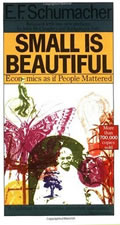 “As a farmer who’s not very well educated, there are many things in the book I don’t understand. But I think what’s most important is the discussion on modes of production. Small-scale production saves a lot of energy and allows human beings to develop our potential in a better way. Because of this, I love this book. One line in the book impresses me a lot: ‘Modern scientists have invented many useful machines but also many useless people.’” Gao Qingrong continues: “I think what the writer says is very meaningful. Look at those farmers who use chemical pesticides, fertilizers and herbicides! What they do everyday is to play mah-jong and this is how they pass their time. This book cares about the value of people. I think the many resources of the world are very valuable and should not be wasted by us, or mined by us arbitrarily. Because of this, I think human beings should live a simple life.”
“As a farmer who’s not very well educated, there are many things in the book I don’t understand. But I think what’s most important is the discussion on modes of production. Small-scale production saves a lot of energy and allows human beings to develop our potential in a better way. Because of this, I love this book. One line in the book impresses me a lot: ‘Modern scientists have invented many useful machines but also many useless people.’” Gao Qingrong continues: “I think what the writer says is very meaningful. Look at those farmers who use chemical pesticides, fertilizers and herbicides! What they do everyday is to play mah-jong and this is how they pass their time. This book cares about the value of people. I think the many resources of the world are very valuable and should not be wasted by us, or mined by us arbitrarily. Because of this, I think human beings should live a simple life.”
![]()
Silent Spring,
by Rachel Carson
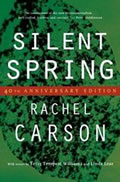 “It talks about the harm chemical pesticides, such as DDT, brought to our health and our environment. After reading it, you will know that in the production process of the vegetables you buy in the market, and the staple foods we eat every day, a lot of this stuff has been used. You won’t dare to eat them anymore. In this light, ecological agriculture appears more important than ever.”
“It talks about the harm chemical pesticides, such as DDT, brought to our health and our environment. After reading it, you will know that in the production process of the vegetables you buy in the market, and the staple foods we eat every day, a lot of this stuff has been used. You won’t dare to eat them anymore. In this light, ecological agriculture appears more important than ever.”
Reference: Anlong Agriculture Story, published by the Chengdu Urban Rivers Association


